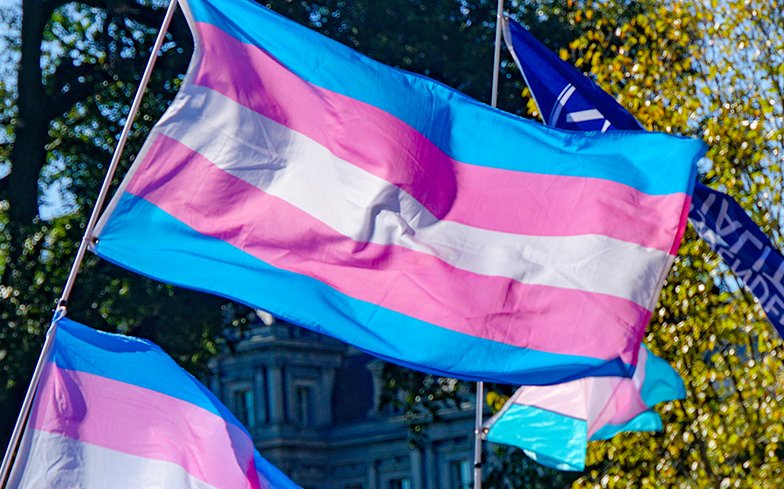Efforts Nationwide Attempt to Bar Transgender Athletes from Women’s Sports
Transgender athletes face obstacles in their participation within women’s sports. Photo Courtesy of Gay Times and Ted Eytan.
April 1, 2022
Across the country, bills, groups, and individuals seeking to exclude transgender athletes from women’s sports are increasing in number amidst the national culture war concerning LGBTQ+ and women’s rights.
On Wednesday, March 30th, Oklahoma joined 12 other states when Governor Kevin Stitt (R) signed the “Save Women’s Sports Act” into law, banning transgender girls and women from playing on female sports teams.
As he was surrounded by young girls, female athletes, and various conservative lawmakers, Stitt insisted, “We are protecting women’s sports. We’re ensuring a level playing field for female athletes who work hard to train hard, who are committed to their team, who have dreams to be No. 1 in their sport, who deserve a fair competition…The reality is, men are biologically different than women.”
Oklahoma’s decision isn’t the only measure to impose transgender sports bans in recent times. On the very same day, Arizona’s Republican Governor Doug Ducey signed a bill limiting transgender participation in women’s sports immediately after approving a restrictive abortion rights bill. The Governor echoed the sentiments of fellow conservatives who express concern over the “integrity of women’s sports”, stating, “Every young Arizona athlete should have the opportunity to participate in extracurricular activities that give them a sense of belonging and allow them to grow and thrive.”
In South Carolina, too, legislators from the House Education Meeting met on Wednesday to discuss and hear final rebuttals to the “Save Women in Sports Act”, prospectively banning transgender women from participating in high school and college sports.
Measures of this manner continue to prevail with the slightest proof legislators find in sports, such as transgender swimmer Lia Thomas’ recent NCAA championship victory in the 500-yard freestyle category, sparking confusion and raised eyebrows. Many argued that her biological sex played a role in her win, alluding to a “greater problem” of an inherent advantage of transgender athletes in women’s sports.
NCAA had previously changed its eligibility criteria for transgender varsity athletes in college sports, announcing that athletes had to look to requirements set by their respective sport’s national governing body on January 19th; now, people claim these implementations are not nearly enough.
These efforts are just a couple of the several other acts that have been implemented to exclude transgender athletes from women’s sports divisions—which, until two years ago, had not been contested. Idaho’s 2020 “Fairness in Women’s Sports Act” shoved the issue into the spotlight as lawmakers passed the nation’s first sports participation legislation.
At the time, U.S. District Judge David C. Nye was a vehement opponent of the bill, stating that, “…[T]he incredibly small percentage of transgender women athletes in general, coupled with the significant dispute regarding whether such athletes actually have physiological advantages over cisgender women when they have undergone hormone suppression in particular, suggest the act’s categorical exclusion of transgender women athletes has no relationship to ensuring equality and opportunities for female athletes in Idaho.”
While bills excluding transgender athletes prevailed in proposition despite Judge Nye’s rulings, others who agree with his ideas spoke up about the problems with laws of this nature, stressing that they go beyond the tag of “it’s just common sense.” Utah’s Governor Spencer Cox vetoed his state’s version of the “Save Women’s Sports Act” because of such reasons, citing a suicide risk of 86% among trans youth, along with the fact that only four transgender kids played high school sports in his state.
In a letter to the Utah House and Senate, Governor Cox wrote, “Four kids and only one of them playing girls sports. That’s what all of this is about. Four kids who aren’t dominating or winning trophies or taking scholarships. Four kids who are just trying to find some friends and feel like they are a part of something. Four kids trying to get through each day.
“Rarely has so much fear and anger been directed at so few. I don’t understand what they are going through or why they feel the way they do. But I want them to live. And all the research shows that even a little acceptance and connection can reduce suicidality significantly.”
Like most political issues, this matter will continue to stir differing opinions; and it will only be heightened by the relevant discussion regarding LGBTQ+ groups in the context of women’s rights.







